文学翻译unit 3《翻译方法:如何选择词义》
Unit 3 翻译的方法
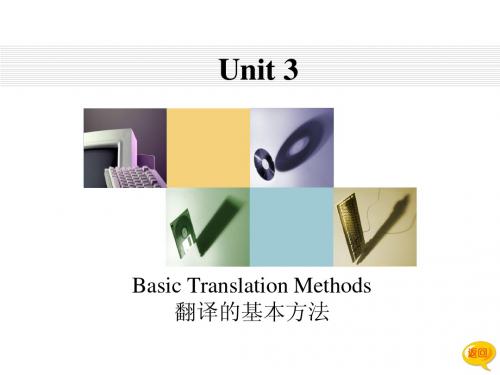
直译 (Literal Translation):就是指译文不但完整而正确地 表达原文的内容,而且还基本上保留原文表达的形式,比 如保留原文所使用的词语、句子结构、修辞手法等,如原 文中的比喻,原文的形象,原文的民族特色等等。 By literal translation, you can get the original meaning preserving the way of expression without destroying the stylistic features and rhetoric images.
Are there any other similar Chinese expressions? Which translation do you prefer?
返回
SECTION 2
5.He walked at the head of the funeral procession, and every now and then wiped away his crocodile tears with a big handkerchief. What is the similar Chinese expression of “crocodile tears ”? A.他走在送葬队伍的前头, 还不时用一条大手绢抹去 他那鳄鱼泪。 B.他走在送葬队伍的前头, 还不时用一条大手绢假惺 惺的抹眼泪。 C. 他走在送葬队伍的前头,做出一副猫哭老鼠的样子搽 眼泪。
返回
SECTION 3
3. Let sleeping dogs lie. A.让睡着的狗躺着。 B别惹麻烦。 4. Love me, love my dog. A.爱我,也爱我的狗吧。 B.爱屋及乌。 5. He who has mind to beat his dog will easily find a stick. A.要想打狗就很容易找到一根棍子。 B.欲加之罪,何患无辞。
文学翻译方法

文学翻译方法文学翻译是一门艺术,它不仅需要熟练的语言功底,更需要对原文的理解和感受,以及对目标语言文学的深刻理解。
在进行文学翻译时,我们需要运用一些特殊的方法和技巧,以确保译文能够忠实地传达原文的意境和情感。
下面将介绍一些常用的文学翻译方法。
首先,文学翻译需要注重对原文的理解。
在进行文学翻译时,译者需要深入理解原文的内涵和情感,把握原文作者的写作意图和风格特点。
只有深入理解了原文,译者才能准确地表达原文的含义和情感,使译文更具有文学性和艺术性。
其次,文学翻译需要注重对目标语言文学的理解。
译者需要熟悉目标语言的文学特点和表达方式,了解目标语言读者的阅读习惯和文学品味。
在翻译过程中,译者需要灵活运用目标语言的表达方式,使译文更贴近目标语言读者的阅读习惯和文学品味。
此外,文学翻译还需要注重对译文的审美效果。
译者需要注重译文的语言美感和节奏感,力求用优美流畅的语言表达原文的意境和情感。
在翻译过程中,译者需要注重修辞手法的运用,使译文更具有文学性和艺术性。
最后,文学翻译需要注重对译文的校对和修改。
在完成初稿后,译者需要对译文进行反复校对和修改,确保译文的准确性和流畅性。
译者还可以邀请其他具有文学翻译经验的人士对译文进行审查,以获得更多宝贵的意见和建议。
总之,文学翻译是一门艺术,它需要译者具备扎实的语言功底和丰富的文学修养。
在进行文学翻译时,译者需要注重对原文和目标语言文学的深入理解,灵活运用翻译方法和技巧,力求使译文更具有文学性和艺术性。
希望以上介绍的文学翻译方法能够对您有所帮助,谢谢阅读!。
文学翻译方法

文学翻译方法文学翻译是将一种语言中的文学作品转化为另一种语言的过程。
它要求翻译者具备扎实的语言功底和深厚的文学修养。
下面介绍一种文学翻译的方法。
首先,文学翻译要注重原著的细节和特色。
翻译者应仔细研读原著,了解其背景和文化内涵。
只有深入理解原著作者的意图,才能更好地将其转化为另外一种语言。
此外,翻译者还应注重原著的细节,如文学修辞手法、情感表达等,力求做到准确传达原著的风格和特色。
其次,文学翻译需要注重语言的优美和流畅。
文学作品往往具有丰富的语言表达和独特的韵律感,在翻译时要尽量保持原作的味道。
翻译者应运用恰当的词汇和句子结构,使译文听起来自然流畅,并尽可能还原原著的语言美感。
此外,翻译者还要善于调整语气和节奏,根据原作的需要,使译文与原著在语言风格上保持一致。
第三,文学翻译需要注重文化和历史差异的处理。
不同的文化和历史背景会对文学作品产生深远的影响。
翻译者需要了解各种文化和历史背景,以便在翻译中进行恰当的转换。
在处理文化差异时,翻译者应注意保持原著的文化气息,不过度翻译,也不应过于西化。
同时,还要注重历史背景的考虑,如适当解释或说明一些历史事件或文化现象,使译文更容易被读者理解和接受。
最后,文学翻译需要注重译者的创造力和灵感。
文学作品往往涉及到丰富的意象和隐喻,使用复杂的句法结构和词汇。
在翻译时,翻译者需要具备创造性思维,灵活运用各种翻译技巧和方法,使译文既忠实于原著,又具有一定的译者个人风格。
翻译者还可以借鉴其他文学作品的翻译经验,以提高译文的质量和可读性。
综上所述,文学翻译是一种综合性的任务,它要求翻译者具备扎实的语言功底、深厚的文学修养和良好的创造力。
翻译者应注重原著的细节和特色,保持译文的优美和流畅,处理文化和历史差异,并且运用自己的创造力和灵感,使译文能够准确传达原著的意图和风格。
只有这样,才能实现文学作品的跨文化传播和艺术价值的最大化。
《英汉互译》教案与讲义
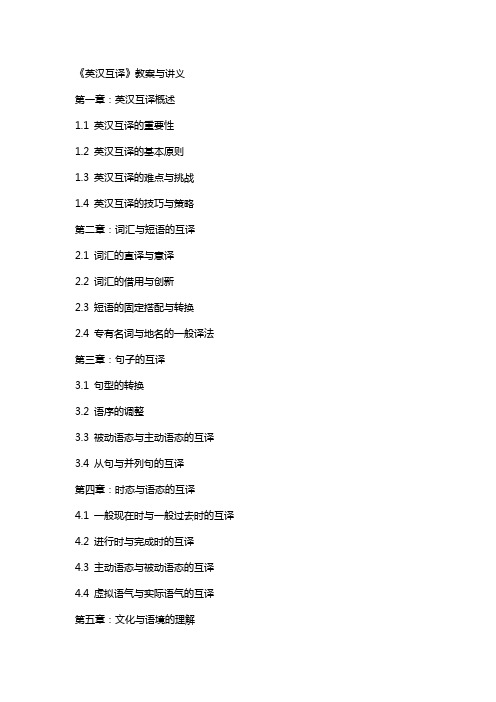
《英汉互译》教案与讲义第一章:英汉互译概述1.1 英汉互译的重要性1.2 英汉互译的基本原则1.3 英汉互译的难点与挑战1.4 英汉互译的技巧与策略第二章:词汇与短语的互译2.1 词汇的直译与意译2.2 词汇的借用与创新2.3 短语的固定搭配与转换2.4 专有名词与地名的一般译法第三章:句子的互译3.1 句型的转换3.2 语序的调整3.3 被动语态与主动语态的互译3.4 从句与并列句的互译第四章:时态与语态的互译4.1 一般现在时与一般过去时的互译4.2 进行时与完成时的互译4.3 主动语态与被动语态的互译4.4 虚拟语气与实际语气的互译第五章:文化与语境的理解5.1 文化背景知识的重要性5.2 语境的理解与运用5.3 语言习惯与表达方式的差异5.4 跨文化交流的技巧与策略第六章:翻译标准与原则6.1 翻译标准的历史演变6.2 忠实原则与达意原则6.3 等效翻译与功能翻译6.4 翻译中的创译与意译第七章:翻译技巧与策略(上)7.1 词义选择与词性转换7.2 修辞格的翻译7.3 成语与谚语的翻译7.4 诗歌与文学作品的语言特点与翻译第八章:翻译技巧与策略(下)8.1 幽默与讽刺的翻译8.2 商务与法律文本的翻译8.3 科技与医学文本的翻译8.4 翻译中的校对与润色第九章:实践案例分析9.1 英汉互译案例分析9.2 翻译错误分析与避免9.3 翻译实践与反馈9.4 翻译作品的评价与赏析第十章:翻译软件与辅助工具10.1 翻译软件的种类与功能10.2 翻译辅助工具的使用10.3 语料库与在线翻译资源10.4 在翻译领域的应用与展望重点和难点解析一、英汉互译概述难点解析:理解英汉两种语言的结构差异,如语序、句型、时态和语态的使用,以及文化背景和语境的理解。
二、词汇与短语的互译难点解析:不同语言中词汇的内涵和外延可能存在差异,需要根据语境进行适当的调整。
三、句子的互译难点解析:不同语言的句子结构差异,如主被动语态的转换,以及保持原意的调整语序。
英汉翻译教程第三章
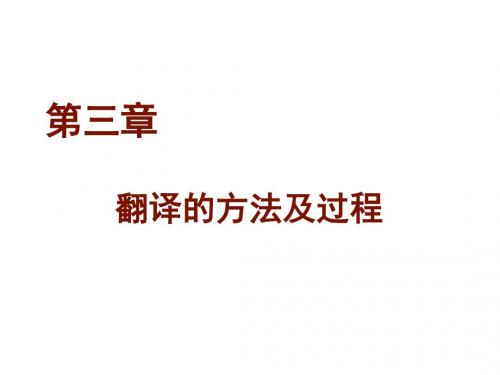
翻译的方法及过程
翻译的过程 第一步:理解原文
↓ 理解原文作者的真正意图→ 语义对等
第二步:表达
↓ 用地道、通顺的语言表达原文意义→语用对等
翻译的方法 一、直译(literal translation) 译文(translation)既忠实原文 (source text)的内容(content) 又符合原文的结构形式(form) 二、意译(liberal translation) 在忠实原文内容的前提下,摆脱原 文结构形式的束缚,使译文符合目 的语(target language)的行文规范。
Байду номын сангаас
英文的日期、地点等的排列是从小单位到大 单位;单词连用时是分量轻的在前,分量重 的在后,中文则相反。例如:
Helen was born at 10 p.m. on 3rd March, 1990. 海伦出生于1990年3月3日晚10点。 He came from a small town in South China. 他来自于中国南方的一个小镇。 I have been to Hua Mountain, Shaanxi province,China. 我曾经去过位于中国陕西省的华山。
Look before you leap. 三思而后行。 It will be five years before we can meet again. 五年以后我们才能再见面。
正反翻译 英语从正面表达,汉语译文从反面表达
Haste makes waste. 欲速则不达。 All good things must come to an end. 天下没有不散的宴席。 He knew he was mortally ill. 他知道自己得的是不治之症。 Excuse me.I’m at a loss in recalling your name. 对不起,我想不起你的名字了。
《大学汉英翻译教程》 第三章 词语的英译与常用技巧

• … because of their glamorous looks and affected manners, were universally known by the nickname of Darling and Precious. (David Hawkes译)
• 文中的“香怜”和“玉爱”这两个名字的蕴含 意义在原文语言环境下尤为重要,因此杨宪益 夫妇和Hawkes都选择放弃音译,而是根据其 内含的文化,用地道的英文昵称来将其译出, 更能体现出原文展现的文化风格。
• ③这部美剧很有意思。
• This American TV series is very interesting. • 这句中的“意思”的指称意义是“有趣,趣
味”,因而用“interesting”。 • ④我们快走吧,天有点要下雨的意思。
• Let’s hurry up. It is likely to rain soon. • 本句中的“意思”则是指“某种趋势或迹象”,
• 3.2.3 根据语言语境消除歧义
• 我们来看徐迟的《哥德马赫猜想》中的这样一段对话: • “你们算了!”老师笑着说,“算了!算了!” • “我们算了!我们算了,我们算出来了!” • “你们算啦,好啦好啦,我是说你们算了吧,白费这个力气做什么?你
们这些卷子我是看看不会看的,用不着看,那么容易吗?”
this vain attempt? I won’t check your papers, because there is no need. Don’t you think this is that easy?”
unit 3 词义的确定

(2)名词注意单复数 ) 同一个名词,用单数和用复数词义往往不 同。 e.g. p38 1.2.3. 集合名词有时是单数形式、复数概念,后面 的系动词可能是is (was), 也可能是are (were)。 e.g. The military were as dangerous as they were ridiculous. 《新英汉》“[集合名词] 军人(尤指军官)” “这些军人既危险又愚蠢。”
The world is in the deepest economic slump in a half-century. 世界目前正面临 正面临半世纪以来最严重的经济衰退。 正面临 。 (in 表示状态、情况) Now, dear, hurry home and make yourself pretty in your pink dress. 好吧,乖孩子,赶紧回家,穿上 穿上那身粉红衣服, 穿上 打扮得漂漂亮亮的。( in 表示穿着、打扮) 。( Proverbs in Latin American Talk 拉美人言谈中的 中的谚语( in 表示范围、领域、方面 中的 ( )
(3)根据搭配和上下文来确定词义 )
e.g1. n. “credit” He got all the credit for the discovery. 他由于这项发明而获得各种荣誉 荣誉。 他由于这项发明而获得各种荣誉。 The availability of cheap long term credit would help small business. 低息长期贷款可以扶持小型企业。 贷款可以扶持小型企业 低息长期贷款可以扶持小型企业。 How much do I have to my credit? 我的银行户头上还有多少存款? 银行户头上还有多少存款 我的银行户头上还有多少存款? They can’t obtain credit at all in the trade. 他们的生意信誉已荡然无存。 信誉已荡然无存 他们的生意信誉已荡然无存。 They have opened the covering credit with the bank of China, London. 他们已从伦敦中国银行开立了有关的信用证 信用证。 他们已从伦敦中国银行开立了有关的信用证。
新编汉英翻译教程 第三章
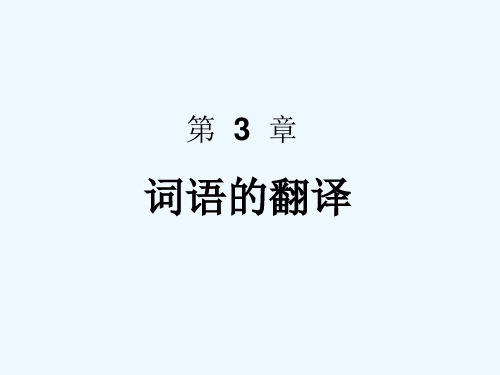
*词语的指称意义往往具有多重性,即一个词语具有几 种不同的指称意义.
例如:“包袱”一词既可以指用布包起来起来的包儿,又可以指 相声等曲艺节目中的笑料.
*词语的搭配关系---辨析词语多重义项的依据,也是翻 译中理解词义的重要手段。
例如:英军胜利地登上了小岛. a. The British army climbed onto the island successfully. b. The British army landed on the island successfully. “登”一词既有“爬,攀登”之意,又可理解为“登 陆”.从本句的上下文看,登这一动作的施动者是军队,对象 是小岛而非高山,“登上”意为登陆上岸,应译作land on,而 非climb onto.
c:据传说,五十年代中期,渠边那庄子有一个黄花闺女,为了抗 拒父母包办的婚姻,大白天就跑过斗渠到这屋里来上吊.这是个 上吊的好地方,屋顶上没有顶棚,弯完扭扭的木头椽子露在外面, 随便哪根椽子都可以搭上绳子. As a story goes in the mid 1950s there lived a hamlet over the other side of the gully a maiden who was in the protest against her parents’ dictatorially arranged marriage escaped in broad daylight across the gully, slipped into the hut—and hanged herself! There was no ceiling, only crooked, bare rafters overhead, conveniently accessible for a rope to hang from. A most suitable place, indeed, for such a purpose.
大学英语实用翻译教程Unit 3(1) 直译与意译
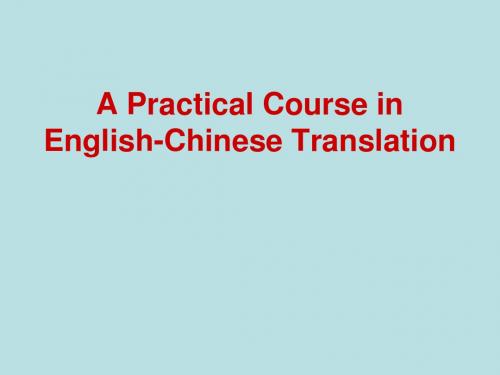
根据《圣经》故事《马太福音》(20: 2-16,Matthew): 葡萄园主招人到园里工作,议定一天一钱银子。他清早雇用了一 批工人,11 小时之后,快收工时,他又雇用了一批。收工时,迟来的 和早来的一样,都获得一钱银子工资。早来晚来,报酬都一个样,何 必早来呢?真是“来得早不如来得巧”,不如在关键、最后决定时刻 来。自从有了这个故事以后,人们便大量使用 at the eleventh hour 这 个成语,含义也固定下来,成为“最后(关键、危急)时刻”。
Liberal Translation 意译
在汉译英时,也可采用类似的方法来表达不为西方读者 所熟悉的意向或含义。 1)两岸同胞要加强交往,促进经济文化交流,继续拓展 领域、提高层次,推动直接“三通”。 The compatriots on both sides of the Straits need to increase contacts, promote economic and cultural exchanges in more areas and at higher levels and push for the resumption of direct links of mail, transport and trade. 2) 我过去受的那些委屈和刺激,比起他来,简直就是小 巫见大巫,算不了什么。 What little pain and adversity I’ve experienced so far are simply nothing compared to what he' s gone through.
3.1.2 意译(Liberal Translation )
《英语翻译教案》课件

《英语翻译教案》PPT课件第一章:翻译的基本概念1.1 翻译的定义解释翻译的概念强调翻译的目的是传递信息和文化1.2 翻译的类型介绍不同类型的翻译,如直译、意译、同声传译等解释每种翻译类型的特点和应用场景1.3 翻译的标准和原则介绍翻译的标准,如准确性、可读性、忠实原文等强调翻译时应遵循的原则,如保持原文的意义和风格第二章:翻译的基本技巧2.1 词汇翻译技巧解释词汇翻译的基本原则,如词义选择、词性转换等举例说明常用翻译技巧,如直译、意译、借译等2.2 句子翻译技巧介绍句子翻译的基本原则,如句子结构对等、语序调整等举例说明常用翻译技巧,如被动语态的转换、从句的翻译等2.3 段落和文章翻译技巧解释段落和文章翻译的基本原则,如连贯性、一致性等举例说明常用翻译技巧,如段落结构的调整、文章风格的保持等第三章:英语语法和句型3.1 英语语法基本概念介绍英语语法的基本概念,如时态、语态、语气等强调语法在翻译中的重要性3.2 英语句型结构解释英语句型的基本结构,如主谓宾结构、主谓表结构等举例说明不同句型的翻译方法3.3 英语特殊句型和短语介绍英语特殊句型和短语的翻译方法,如倒装句、省略句等举例说明常用特殊句型和短语的翻译技巧第四章:文化差异与翻译4.1 文化差异对翻译的影响解释文化差异对翻译的影响,如语言表达习惯、文化背景知识等强调翻译时应注意文化差异的重要性4.2 英语和汉语的文化差异举例说明英语和汉语在词汇、表达方式、语法等方面的文化差异强调翻译时应考虑目标语言的文化背景4.3 翻译中的文化适应和调整介绍翻译中如何进行文化适应和调整,如词义选择、增减内容等举例说明文化适应和调整的翻译技巧第五章:翻译实践与评价5.1 翻译实践的重要性强调翻译实践在学习和提高翻译能力中的重要性鼓励学生积极参与翻译实践,提高翻译技能5.2 翻译评价的标准和方法介绍翻译评价的标准,如准确性、流畅性、忠实原文等解释翻译评价的方法,如同行评审、自我评价等5.3 翻译实践案例分析提供翻译实践案例,让学生进行翻译和评价分析案例中的翻译优点和不足,提供改进建议第六章:翻译软件与工具6.1 翻译软件的概述介绍目前市面上常见的翻译软件和工具,如谷歌翻译、DeepL等强调翻译软件在辅助翻译工作中的作用6.2 翻译软件的使用方法详细讲解如何使用翻译软件进行翻译强调翻译软件的局限性,如准确性、语境理解等6.3 翻译软件与人工翻译的结合介绍如何将翻译软件与人工翻译相结合,以提高翻译效率强调翻译软件只能作为辅助工具,不能完全替代人工翻译第七章:口译技巧与实践7.1 口译的基本概念解释口译的概念和类型,如同声传译、交替传译等强调口译的特点,如即时性、准确性等7.2 口译技巧介绍口译技巧,如听力训练、短期记忆训练、语言表达训练等强调口译技巧在实际口译工作中的重要性7.3 口译实践与评价提供一个口译实践案例,让学生进行口译练习分析案例中的口译优点和不足,提供改进建议第八章:商务翻译技巧8.1 商务翻译的特点解释商务翻译的特点,如专业性、实用性、准确性等强调商务翻译在实际工作中的重要性8.2 商务翻译技巧介绍商务翻译技巧,如术语准确运用、句子结构优化等举例说明商务翻译中常用的翻译技巧8.3 商务翻译实践与评价提供一份商务翻译案例,让学生进行翻译练习分析案例中的翻译优点和不足,提供改进建议第九章:文学作品翻译技巧9.1 文学作品翻译的特点解释文学作品翻译的特点,如艺术性、想象力、文化适应等强调文学作品翻译在文化传承中的重要性9.2 文学作品翻译技巧介绍文学作品翻译技巧,如词义选择、形象表达等举例说明文学作品翻译中常用的翻译技巧9.3 文学作品翻译实践与评价提供一篇文学作品翻译案例,让学生进行翻译练习分析案例中的翻译优点和不足,提供改进建议第十章:翻译职业规划与发展10.1 翻译职业概述介绍翻译职业的现状和发展趋势强调翻译职业的重要性和前景10.2 翻译职业技能要求解释翻译职业技能的要求,如语言能力、翻译技巧、跨文化交际能力等强调翻译职业技能在实际工作中的重要性10.3 翻译职业规划与发展介绍翻译职业规划的方法和建议,如持续学习、拓展业务领域等强调翻译职业发展的关键因素,如个人能力、市场需求等重点和难点解析重点环节一:翻译的类型和标准翻译类型:直译、意译、同声传译等,以及它们的定义和应用场景。
Unit 3 英译汉常用的九种技巧
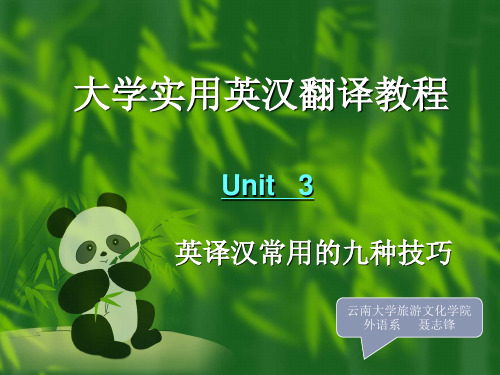
4. This is the last place where I expected to meet you.
我怎么也没料到会在这见到你.
5. This is the last thing in labor saving devices.
在节省劳动力方面,这是醉心发明物。
C.
试译下列句子,注意红色字的译法 1.
(1) The machine works properly. (2) The watch doesn't work. (3) The threads of the screw work hard. (4) Does the cleaning fluid work on the stain?
10. He is the last person to consult.
他是最后一个来咨询的.根本不宜找他商量
11. The yeast hasn't worked now.
酵母现在没有工作.
词义的引申 green green fingers 园艺技能 green-eyed 嫉妒 green hand 新手 green grocer 果蔬商 greenhouse 温室,暖房
一词多义
A. story 1.It's quite another story now. 现在情形完全不同了。 2. The official concerned refused to confirm the story in the news paper. 有关官员拒绝证实报纸上的这条消息. 3. The white-haired girl's story is miserable. 白毛女的遭遇(故事)真悲惨. 4. A young man came to the police station with a story. 一个年轻人来到派出所报案.
文学作品翻译方法
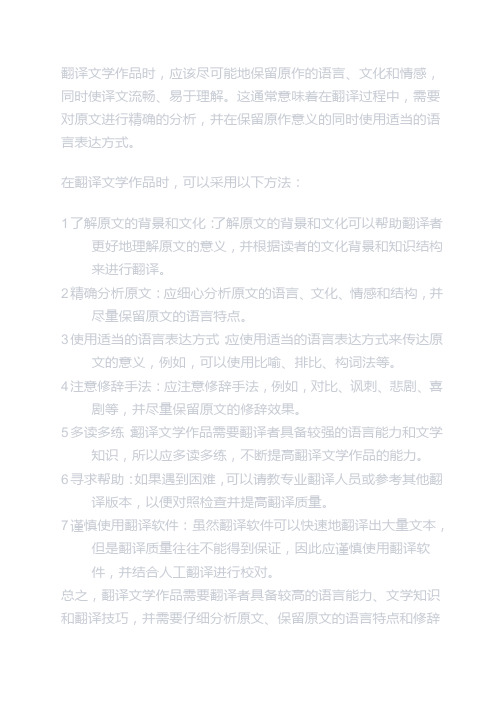
翻译文学作品时,应该尽可能地保留原作的语言、文化和情感,同时使译文流畅、易于理解。
这通常意味着在翻译过程中,需要对原文进行精确的分析,并在保留原作意义的同时使用适当的语言表达方式。
在翻译文学作品时,可以采用以下方法:
1 了解原文的背景和文化:了解原文的背景和文化可以帮助翻译者
更好地理解原文的意义,并根据读者的文化背景和知识结构来进行翻译。
2 精确分析原文:应细心分析原文的语言、文化、情感和结构,并
尽量保留原文的语言特点。
3 使用适当的语言表达方式:应使用适当的语言表达方式来传达原
文的意义,例如,可以使用比喻、排比、构词法等。
4 注意修辞手法:应注意修辞手法,例如,对比、讽刺、悲剧、喜
剧等,并尽量保留原文的修辞效果。
5 多读多练:翻译文学作品需要翻译者具备较强的语言能力和文学
知识,所以应多读多练,不断提高翻译文学作品的能力。
6 寻求帮助:如果遇到困难,可以请教专业翻译人员或参考其他翻
译版本,以便对照检查并提高翻译质量。
7 谨慎使用翻译软件:虽然翻译软件可以快速地翻译出大量文本,
但是翻译质量往往不能得到保证,因此应谨慎使用翻译软
件,并结合人工翻译进行校对。
总之,翻译文学作品需要翻译者具备较高的语言能力、文学知识和翻译技巧,并需要仔细分析原文、保留原文的语言特点和修辞
效果,使译文流畅、易于理解。
新英汉翻译课件教程 Chapter 3 翻译方法

CHAPTER THREE
Approaches of Translation
3.1 Literal Translation vs. Liberal/Free Translation
• 例2: The first time I saw her, half of my life ago, she nearly took my breath away. • 【译文】那还是半辈子前的事,我第一次看见她,她差一 点把我的魂都勾走了。 • 【解析】若把took my breath away译成“把呼吸夺走 了”,恐怕谁也看不懂是什么意思。下一句也同样体现了 归化译法的这种特点。 • 例3:High buildings and large mansions are springing up like mushrooms in Beijing. • [译文] 在北京,高楼大厦犹如雨后春笋般地涌现。 • 在北京,高楼大厦犹如蘑菇般地涌现。 • 因此,在进行文化传译时,既要尽量传达原作的异国情调, 又要确保译文为译语读者所接受。
课堂互动练习 :翻译句子
• 翻译下列句子,注意斜体部分的表达。 • 1) Dawn breaking over the islands, very beautiful in a soft grey light with many clouds. There is a transparency about the light here which cannot be described or painted. • 2) When we make friends, we should choose those who are our supporters in danger. (Aesop)
2020考研英语:翻译三步分析法

2020考研英语:翻译三步分析法考研英语有许多题目组成,方便大家及时了解,下面由小编为你精心准备了“2020考研英语:翻译三步分析法”,持续关注本站将可以持续获取更多的考试资讯!2020考研英语:翻译三步分析法翻译的过程大致分为三步:理解、表达与校正理解指对原文的理解,主要是指首先找到要翻译句子的主谓结构,看看这句话主要讲什么,然后再找出句子的其他成分,如定语、宾语、状语等。
表达是指把原文分析后,用译文表达。
校正就是在完成了表达之后,对照原文进行检查,看看所选词义是否符合上下文,原文要表达的意思有没有表达错误,汉语的译文中意义上是否与原文对等,译文有没有译者增加的不是原文作者的意思,或者译者删减,丢失了原文作者要表达的意思。
理解原文是翻译关键、最易出问题的一步。
译文的模糊不清很多时候是源于译者对原文理解得不透彻、不仔细。
理由可以从以下几个方面来考虑:(1)搞清句子结构,辨别主语和谓语。
抓住了句子的主干,各部分之间的从属关系也就看得比较清楚,有益于从整体把握句子。
(2)理解虚拟语气。
虚拟语气是英语特有的一种表达方式,它包括对现在、未来、过去的假设,在英语中有多种表现,译成汉语时一定要弄清它的对象和范围,尽量把虚拟的意思传达出来。
(3)搞清楚关系。
句中如果有代词,应根据上下文找出其所指代的内容,并将其准确地翻译出来。
(4)明白否定的方式。
英语思维的特点也表现在它对否定式的用法上,中国读者往往容易在这里产生错误。
例如All that glitters is not gold.(发光的未都是金子)在这里是以全部否定的形式来表达部分否定的事实。
英语也用双重否定表示肯定,这种现象英语中常见,汉语中并不常见,翻译时需要多加注意。
(5)一词多义。
一词多义是很常见的现象。
判断词义一定要根据上下文确定其具体的义,不能因为是过去认识的词便不加深究,便草率地按以前的理解翻译而产生错误。
如Don‘tworryaboutpreparationsforthisyear’sJulyFourthparade.E verythingisinapplepieorder.(别担心今年国庆日游行的准备事宜,样样东西都弄妥当了)如按通常的理解以为apple是“苹果”的意思,就出错了,(6)注意英国英语和美国英语的不同。
第三讲文学翻译的方法和技巧及语言和形式
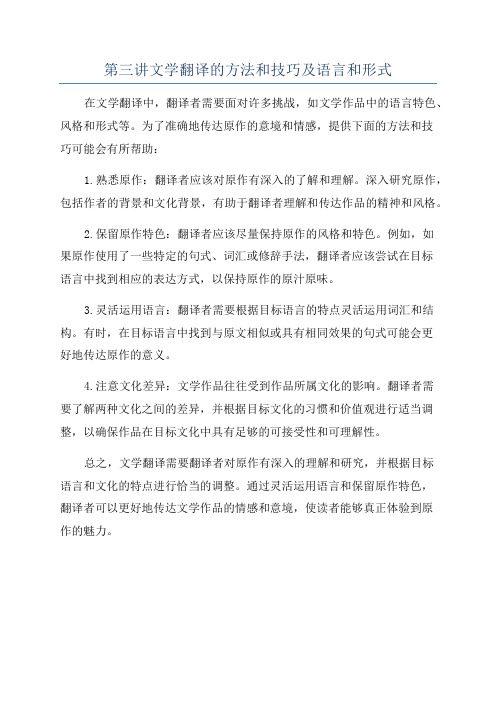
第三讲文学翻译的方法和技巧及语言和形式在文学翻译中,翻译者需要面对许多挑战,如文学作品中的语言特色、风格和形式等。
为了准确地传达原作的意境和情感,提供下面的方法和技
巧可能会有所帮助:
1.熟悉原作:翻译者应该对原作有深入的了解和理解。
深入研究原作,包括作者的背景和文化背景,有助于翻译者理解和传达作品的精神和风格。
2.保留原作特色:翻译者应该尽量保持原作的风格和特色。
例如,如
果原作使用了一些特定的句式、词汇或修辞手法,翻译者应该尝试在目标
语言中找到相应的表达方式,以保持原作的原汁原味。
3.灵活运用语言:翻译者需要根据目标语言的特点灵活运用词汇和结构。
有时,在目标语言中找到与原文相似或具有相同效果的句式可能会更
好地传达原作的意义。
4.注意文化差异:文学作品往往受到作品所属文化的影响。
翻译者需
要了解两种文化之间的差异,并根据目标文化的习惯和价值观进行适当调整,以确保作品在目标文化中具有足够的可接受性和可理解性。
总之,文学翻译需要翻译者对原作有深入的理解和研究,并根据目标
语言和文化的特点进行恰当的调整。
通过灵活运用语言和保留原作特色,
翻译者可以更好地传达文学作品的情感和意境,使读者能够真正体验到原
作的魅力。
文学翻译unit 3《翻译方法:如何选择词义》
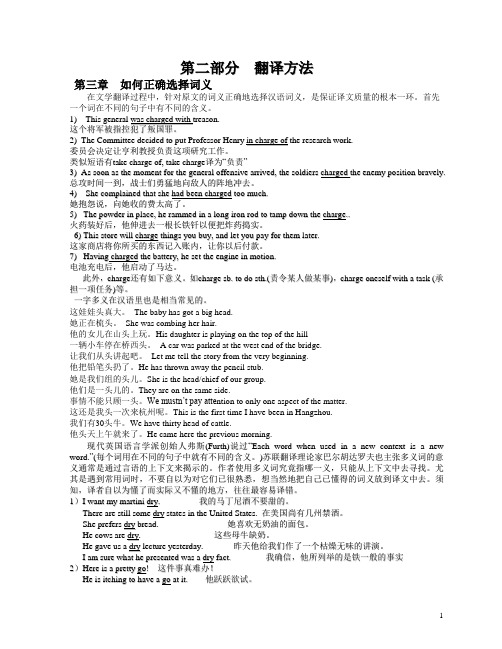
第二部分翻译方法第三章如何正确选择词义在文学翻译过程中,针对原文的词义正确地选择汉语词义,是保证译文质量的根本一环。
首先一个词在不同的句子中有不同的含义。
1)T h i s g e n e r a l w a s c h a r g e d w i t h t r e a s o n.这个将军被指控犯了叛国罪。
2)T h e C o m m i t t e e d e c i d e d t o p u t P r o f e s s o r H e n r y i n c h a r g e o f t h e r e s e a r c h w o r k.委员会决定让亨利教授负责这项研究工作。
类似短语有t a k e c h a r g e o f,t a k e c h a r g e译为“负责”3)A s s o o n a s t h e m o m e n t f o r t h e g e n e r a l o f f e n s i v e a r r i v e d,t h e s o l d i e r s c h a r g e d t h e e n e m y p o s i t i o n b r a v e l y.总攻时间一到,战士们勇猛地向敌人的阵地冲去。
4)S h e c o m p l a i n e d t h a t s h e h a d b e e n c h a r g e d t o o m u c h.她抱怨说,向她收的费太高了。
5)T h e p o w d e r i n p l a c e,h e r a m m e d i n a l o n g i r o n r o d t o t a m p d o w n t h e c h a r g e..火药装好后,他伸进去一根长铁钎以便把炸药捣实。
6)T h i s s t o r e w i l l c h a r g e t h i n g s y o u b u y,a n d l e t y o u p a y f o r t h e m l a t e r.这家商店将你所买的东西记入账内,让你以后付款。
文学翻译方法

文学翻译方法
文学翻译是一门综合性的学科,它要求译者不仅要精通两种语言,还需要对文
学作品有深刻的理解和把握。
在进行文学翻译时,译者需要采取一些方法来确保译文能够忠实地传达原文的意境和情感。
下面将介绍一些常用的文学翻译方法。
首先,译者需要对原文进行深入的分析和理解。
这包括对原文的语言风格、情
感色彩、文化背景等方面的把握。
只有深入理解了原文,译者才能更好地把握原作的意境和情感,并将其准确地表达出来。
其次,译者需要注重语言的美感和节奏感。
文学作品的翻译不仅仅是语义的转换,更重要的是要传达原作的韵律和美感。
译者在翻译时需要注重词语的选择和句子的结构,力求做到既忠实于原文,又能够在目标语言中保持原作的美感和节奏感。
此外,译者还需要注重文化的转换和传达。
文学作品往往承载着丰富的文化内涵,译者在翻译时需要将原作所蕴含的文化元素传达给目标读者,让他们能够更好地理解和感受原作所表达的意境和情感。
最后,译者需要注重审美的再创造。
在进行文学翻译时,译者不仅仅是在进行
语言的转换,更重要的是要进行审美的再创造。
译者需要在保持原作风貌的基础上,根据目标读者的语言习惯和审美需求,对原作进行再创造,使译文更符合目标读者的审美情趣。
总之,文学翻译是一项复杂而又富有挑战的工作。
译者需要具备扎实的语言功
底和丰富的文化知识,同时还需要具备良好的审美能力和再创造能力。
只有通过不懈的努力和实践,译者才能不断提高自己的文学翻译水平,为文学作品的传播和交流做出更大的贡献。
翻译方法:词义的选择共19页文档

翻译方法:词义的选择
6
、
露
凝
无
游
氛
,
天
高
风
景
澈
。
7、翩翩新 来燕,双双入我庐 ,先巢故尚在,相 将还旧居。
8
、
吁
嗟身后名来自,于我
若
浮
烟
。
9、 陶渊 明( 约 365年 —427年 ),字 元亮, (又 一说名 潜,字 渊明 )号五 柳先生 ,私 谥“靖 节”, 东晋 末期南 朝宋初 期诗 人、文 学家、 辞赋 家、散
1
0
、
倚
南
窗
以
寄
傲
,
审
容
膝
之
易
安
。
6、最大的骄傲于最大的自卑都表示心灵的最软弱无力。——斯宾诺莎 7、自知之明是最难得的知识。——西班牙 8、勇气通往天堂,怯懦通往地狱。——塞内加 9、有时候读书是一种巧妙地避开思考的方法。——赫尔普斯 10、阅读一切好书如同和过去最杰出的人谈话。——笛卡儿
文 家 。汉 族 ,东 晋 浔阳 柴桑 人 (今 江西 九江 ) 。曾 做过 几 年小 官, 后辞 官 回家 ,从 此 隐居 ,田 园生 活 是陶 渊明 诗 的主 要题 材, 相 关作 品有 《饮 酒 》 、 《 归 园 田 居 》 、 《 桃花 源 记 》 、 《 五 柳先 生 传 》 、 《 归 去来 兮 辞 》 等 。
- 1、下载文档前请自行甄别文档内容的完整性,平台不提供额外的编辑、内容补充、找答案等附加服务。
- 2、"仅部分预览"的文档,不可在线预览部分如存在完整性等问题,可反馈申请退款(可完整预览的文档不适用该条件!)。
- 3、如文档侵犯您的权益,请联系客服反馈,我们会尽快为您处理(人工客服工作时间:9:00-18:30)。
第二部分翻译方法第三章如何正确选择词义在文学翻译过程中,针对原文的词义正确地选择汉语词义,是保证译文质量的根本一环。
首先一个词在不同的句子中有不同的含义。
1)T h i s g e n e r a l w a s c h a r g e d w i t h t r e a s o n.这个将军被指控犯了叛国罪。
2)T h e C o m m i t t e e d e c i d e d t o p u t P r o f e s s o r H e n r y i n c h a r g e o f t h e r e s e a r c h w o r k.委员会决定让亨利教授负责这项研究工作。
类似短语有t a k e c h a r g e o f,t a k e c h a r g e译为“负责”3)A s s o o n a s t h e m o m e n t f o r t h e g e n e r a l o f f e n s i v e a r r i v e d,t h e s o l d i e r s c h a r g e d t h e e n e m y p o s i t i o n b r a v e l y.总攻时间一到,战士们勇猛地向敌人的阵地冲去。
4)S h e c o m p l a i n e d t h a t s h e h a d b e e n c h a r g e d t o o m u c h.她抱怨说,向她收的费太高了。
5)T h e p o w d e r i n p l a c e,h e r a m m e d i n a l o n g i r o n r o d t o t a m p d o w n t h e c h a r g e..火药装好后,他伸进去一根长铁钎以便把炸药捣实。
6)T h i s s t o r e w i l l c h a r g e t h i n g s y o u b u y,a n d l e t y o u p a y f o r t h e m l a t e r.这家商店将你所买的东西记入账内,让你以后付款。
7)H a v i n g c h a r g e d t h e b a t t e r y,h e s e t t h e e n g i n e i n m o t i o n.电池充电后,他启动了马达。
此外,c h a r g e还有如下意义。
如c h a r g e s b.t o d o s t h.(责令某人做某事),c h a r g e o n e s e l f w i t h a t a s k(承担一项任务)等。
一字多义在汉语里也是相当常见的。
这娃娃头真大。
The baby has got a big head.她正在梳头。
She was combing her hair.他的女儿在山头上玩。
His daughter is playing on the top of the hill一辆小车停在桥西头。
A car was parked at the west end of the bridge.让我们从头讲起吧。
Let me tell the story from the very beginning.他把铅笔头扔了。
He has thrown away the pencil stub.她是我们组的头儿。
She is the head/chief of our group.他们是一头儿的。
They are on the same side.事情不能只顾一头。
We mustn’t pay atte ntion to only one aspect of the matter.这还是我头一次来杭州呢。
This is the first time I have been in Hangzhou.我们有30头牛。
We have thirty head of cattle.他头天上午就来了。
He came here the previous morning.现代英国语言学派创始人弗斯(F u r t h)说过“E a c h w o r d w h e n u s e d i n a n e w c o n t e x t i s a n e w w o r d.”(每个词用在不同的句子中就有不同的含义。
)苏联翻译理论家巴尔胡达罗夫也主张多义词的意义通常是通过言语的上下文来揭示的。
作者使用多义词究竟指哪一义,只能从上下文中去寻找。
尤其是遇到常用词时,不要自以为对它们已很熟悉,想当然地把自己已懂得的词义放到译文中去。
须知,译者自以为懂了而实际又不懂的地方,往往最容易译错。
1)I w a n t m y m a r t i n i d r y.我的马丁尼酒不要甜的。
T h e r e a r e s t i l l s o m e d r y s t a t e s i n t h e U n i t e d S t a t e s.在美国尚有几州禁酒。
S h e p r e f e r s d r y b r e a d.她喜欢无奶油的面包。
H e c o w s a r e d r y.这些母牛缺奶。
H e g a v e u s a d r y l e c t u r e y e s t e r d a y.昨天他给我们作了一个枯燥无味的讲演。
I a m s u r e w h a t h e p r e s e n t e d w a s a d r y f a c t.我确信,他所列举的是铁一般的事实2)H e r e i s a p r e t t y g o!这件事真难办!H e i s i t c h i n g t o h a v e a g o a t i t.他跃跃欲试。
T h e o l d m a n i s s t i l l f u l l o f g o.这位老人仍然精力充沛。
T h e s e b r i g h t l y c o l o r e d s t o c k i n g s a r e a l l t h e g o t h i s s u m m e r.这些颜色鲜明的袜子今夏很流行。
英语单词g o o d是个虚指的抽象词语;在不少情况下,可以用它的基本词义“好”来翻译,如ag o o d m a n(一个好人),a g o o d b o o k(一本好书),g o o d n e w s(好消息)等,但是,比较正规的书面语体里就不能一味用“好”字来翻译g o o d一词了。
例如:3)I t w a s a g i r l w i t h g o o d m a n n e r s.这是一位举止得体的姑娘。
T h e s e w e r e a l l l a b e l e d a s g o o d e g g s.这些都被标为新鲜的鸡蛋。
D o g s a r e o f t e n r e g a r d e d a s m a n’s g o o d f r i e n d s.狗经常被认为是人们的忠实朋友。
…y e t,a s i t s o m e t i m e s h a p p e n s t h a t a p e r s o n d e p a r t s h i s l i f e,w h o i s r e a l l y d e s e r v i n g o f t h e p r a i s e s t h e s t o n e-c u t t e r c a r v e s o v e r h i s b o n e s;w h o i s a g o o d C h r i s t i a n,a g o o d p a r e n t,a g o o d c h i l d,a g o o d w i f e o ra g o o d h u sb a n d;w h o ac t u a l l yd oe s h a v e a d i s c o n s o l a t ef a m i l y t o m o u r n h i s l o s s;…(W.M.T h a c k e r a y:V a n i t y F a i r)……不过偶尔也有几个死人当得起石匠刻在他们朽骨上的好话。
真的是虔诚的教徒,慈爱的父母,孝顺的女儿,贤良的妻子,尽职的丈夫,他们家里的人也的确哀思绵绵的追悼他们;……在英语中还存在着一个词的单数和复数意义全然不同的情况。
兹举例如下:N i n e t y90(单)n i n e t i e s90年代(复)t i m e时间(单)t i m e s时代,此书,倍数(复)f i n d i n g发现,探索(单)f i n d i ng s研究成果,调查结果(复)w o r k工作,功(单)w o r k s工厂,著作,工事(复)还有前后搭配不同而意义不同的情况:1)soft pillow 软枕soft music 轻柔的音乐soft cushion 靠垫soft wood 软木soft money 纸币soft fire 文火soft drink 不含酒精的饮料soft breeze 和风soft light 柔光soft voice 低声soft goods 毛织品soft hat 呢帽soft words 和蔼的话soft heart 慈心soft water 软水soft answer 委婉的回答2)a b r o k e n m a n(在精神等方面)潦倒的人a b r o k e n s o l d i e r伤兵b r o k e n t i m e零星时间b r o k e n m o n e y零钱b r o k e n E n g l i s h不标准的英语a b r o k e n p r o m i s e未践之约a b r o k e n r o a d凹凸不平的路一字多种搭配引起的意义差别在汉语里也是相当常见的。
上班to go to work; to be on duty 上报to appear in the newspaper上场to appear on the stage 上当to be taken in上灯to light the lamp 上吊to hang oneself上冻to freeze 上光glazing; polishing上访to apply for an audience with the higher authorities to appeal for help上坟to visit a grave to honor the memory of the dead上纲to raise to the higher plane of principle上供to offer up a sacrifice 上钩to rise to the bait上轨道to get on the right track 上火to get angry上进to make progress 上课to attend class上口to be suitable for reading aloud 上路to set out on a journey上马to mount a horse 上年纪to be getting on in years上台to come to power 上鞋to sole a shoe上相to come out well in a photograph; to be photogenic 上演to perform上阵to go into battle 上瘾to be addicted to sth.干部要能上能下。
